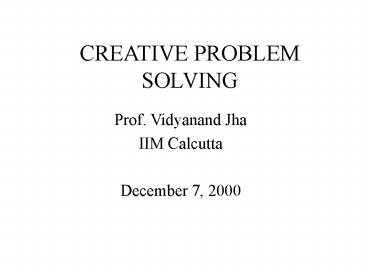CREATIVE PROBLEM SOLVING - PowerPoint PPT Presentation
Title:
CREATIVE PROBLEM SOLVING
Description:
Complex, creative; no prescriptions available, upper level supervisors ... Hitch hike on previous ideas. Brainstorming. Both groups as well as individuals ... – PowerPoint PPT presentation
Number of Views:126
Avg rating:3.0/5.0
Title: CREATIVE PROBLEM SOLVING
1
CREATIVE PROBLEM SOLVING
- Prof. Vidyanand Jha
- IIM Calcutta
- December 7, 2000
2
PROBLEM SOLVING
- Problem - a discrepancy
- current state-desired state
- Decisions- Choices
- Two or more alternatives
- Decision Making
- process of choice making
3
General model of problem solving
- Identify problem
- Define Objective
- Make a predecision
- Generate alternatives
- Evaluate alternatives
- Make a choice
- Implement choice
- Follow up
4
Types of Decisions
- Programmed
- Simple, routine preestablished routines and
procedures lower level workers (usually alone) - Non programmed
- Complex, creative no prescriptions available,
upper level supervisors (usually in groups) - Strategic
- high level, non programmed, directions for
organization
5
Types of Decisions
- Certain vs. uncertain
- knowledge of decision outcomes
- probability of decision outcomes
- information available
- Uncertainty Reduction
6
Types of Decisions
- top down vs. empowered
- decentralisation
- premises
- computers
7
Individual differences in decision making
- Directive
- prefer simple, clear solutions
- make decisions rapidly
- dont consider many alternatives
- rely on existing rules
8
Individual differences in decision making
- Analytical
- prefer complex problems
- carefully analyse alternatives
- enjoy solving problems
- willing to use innovative methods
9
Individual differences in decision making
- Conceptual
- socially oriented
- humanistic and artistic approach
- solve problems creatively
- enjoy new ideas
10
Individual differences in decision making
- Behavioural
- concern for their organizations
- interest in helping others
- open to suggestions
- rely on meetings
11
Moving away from the rational
- bounded rationality
- intuition
- selective perception
- halo effect
- contrast effect
- projection
- stereotyping
- self fulfilling profecy
12
Moving away from the rational
- obvious candidate
- garbage can model
- self interests
- enactment
- training
13
CREATIVE PROBLEM SOLVING
- Using divergent as well as convergent modes of
thinking
14
Creative Problem Solving
- Problem
- goal not achieved
- unwanted symptoms
- Mechanisms
- habit
- logical analysis
- using analogies
15
Creative Problem Solving
- Mechanisms
- generating alternatives
- evaluating alternatives
- looking for information
- Creative
- Use of fantasy and imagination
- Playful connections
- Viewing problem from unusual perspective
- Brainstorming
16
Creative Problem Solving
- Process
- preparation
- incubation
- illumination
- verification
17
Divergent Thinking
- Variety of responses
- Trial and Error Thinking
- Product not completely determined by given
information
18
Creative Thinking
- Divergent as well as convergent
- Grasping the problem
- After divergent
- categorization, logical thinking, evaluation,
comparison, analysis - Cycles of imaginative and rational
19
A model of creative Intelligence
- Problem sensitivity, curiosity
- Sensing of problems, issues, opportunities
- Convergent thinking ability, cause guessing
ability - Structuring of problems
- Problem restructuring ability
20
A model of creative Intelligence
- A new understanding of problem that facilitates
interesting new approaches. - Divergent thinking, search for alternative
approaches, solutions - Fluency
- Flexibility
- Originality
21
A model of creative Intelligence
- Evaluation through convergent thinking
- consequence guessing ability
- elaboration ( idea, approach, solution)
- Refinement through convergent thinking ability
22
Fluency
- Generating more ideas
- Resourcefulness
- More ideas- some good ideas
- associative thinking
- Censorship- silly/impractical
- Generate, then evaluate
- Fluency- flexibility, originality
- Practice situations in daily life
23
Flexibility
- A change
- meaning, interpretation, use, understanding,
strategy - Looking from many angles
- implications of multi-dimensional situations
24
Problem restructuring
- Hawthorne Experiment
- Contingency
- naturopathy
- Discarding old ways of looking
- Creative use of deviance
- internal debate
25
Problem restructuring
- data
- going to roots- slums
- A habit of looking for opportunities in problem
situations - Shoes, garbage
26
Creative Thinking Techniques
- Ideate copiously
- Create constructive psychological strain-
familiar to unfamiliar and back. - Force wide shifts
- Identify most potent idea
27
Creative Thinking Techniques
- Brainstorming
- Attribute Listing
- Synectics
- Checklist of questions
- Structure problem- well understood, identify key
dimensions - Separate idea production from evaluation
28
Creative Environment
- Stimulation
- Nurturance
- Low- tension
- Constructive Feedback
- Opportunity to learn
- Diversity of viewpoints
- Freedom with accountability
29
Creative Environment
- Creators as role models
- Facilities
- creative norms and expectations of boss figure
30
Brainstorming
- Defer Evaluation
- Quantity begets quality
- more fantastic ideas
- Hitch hike on previous ideas
31
Brainstorming
- Both groups as well as individuals
- Better ideas in second half
- for problems with multiple solutions
- concrete suggestions
- Specific topic
- Choosing ideas and developing them
32
Attribute Listing
- For designing/redesign specific product/service
- Building up, grafting , modifying
- List basic but modifiable attributes/properties/sp
ecifications - Generate alternatives
- Grafting attributes of some other object
33
Attribute Listing
- Abstract/generic attributes
- container, handling convenience, current function
- More specific the better
- separate modifiable from unmodifiable
- List all attributes
34
Attribute Listing
- What may be altered without changing the main
function - State as more general/abstract attributes
- What functions the attributes perform
- How critical are they to main function
- prioritizing attributes
35
Checklist of questions
- Questions- Divergent thinking
- ASARAMOMONA
- add
- subtract
- alter
- rearrange
- adapt
36
Checklist of questions
- magnify
- opposite
- minify
- other
- new
- alternative
- Dissatisfaction with status quo































